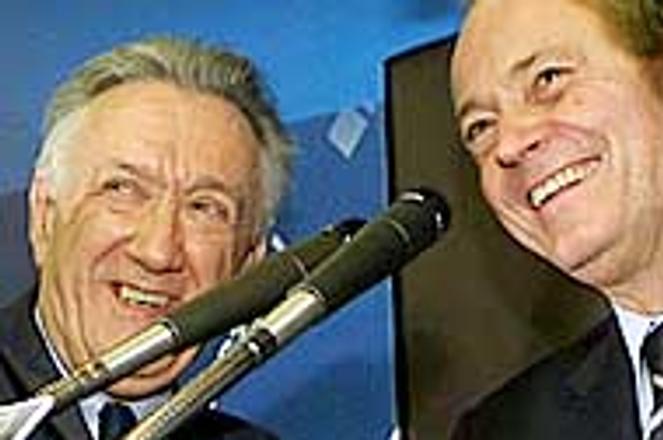LÁSZLÓ Kovács (left) and Péter Medgyessy of the Hungarian Socialist Party.photo: TASR
STRAINED relations between Bratislava and Budapest appear set to improve following the victory of the Socialist Party and the Liberal Alliance of Free Democrats in Hungary's parliamentary elections.
Stalled top-level political co-operation is expected to be revived and aggressive nationalist rhetoric over controversial legislation abandoned after the second and final round of voting April 21 that produced record voter turn-out.
"A European rather than nationalist direction has prevailed in Hungary's elections," Slovak Prime Minister (PM) Mikuláš Dzurinda said of the vote.
Hungarian Socialist Party PM-elect Peter Medgyessy began talks April 22 on forming a coalition government with the centre-left Liberal Alliance of Free Democrats. Initial results suggested the parties will together hold 198 seats in the 386-seat parliament.
The Fidesz (Young Democrats' Union) party, led by incumbent PM Victor Orbán, will form the opposition with 188 seats.
The Prime Minister-elect has already said he plans to make better relations with Slovakia a top priority. Ties between the nations, which had improved since the storminess of the 1994-1998 term of former Slovakia Prime Minister Vladimír Mečiar, were damaged in the months leading up to the election.
Disputes over the Hungarian Status Law, which gave certain rights to ethnic Hungarians in six neighbouring countries, and the Beneš Decrees (post-war legislation under which millions of Germans and Hungarians were expelled from Czechoslovakia) had brought a virtual halt to co-operation within the Visegrad Four (V4) grouping of Slovakia, Hungary, Poland and the Czech Republic.
The Status Law was rejected by Slovak MPs early this year despite being approved by Budapest six months earlier. Slovak and Czech PMs Mikuláš Dzurinda and Miloš Zeman in late February boycotted a planned meeting of Visegrad Four leaders over calls from Orbán for a revocation of the Beneš Decrees.
Politicians from Slovak government and opposition parties have now said they expect a change in tone from Budapest on both issues and a return to what had previously been support for each other's EU accession drives.
"The Beneš Decrees and the Hungarian Status Law were both election themes. The election is now over and the situation has a natural tendency to return to its normal agenda," said František Šebej, an independent MP and head of the parliamentary Integration Committee.
Medgyessy has pledged full support for Slovak integration ambitions following his election victory. In contrast to the stance taken by Orbán, Socialist Party leader László Kovács has also made clear that the Beneš Decrees are not viewed by the new government as a barrier to EU entry for either the Czech or Slovak Republics.
The European Commission has said it expects the new Hungarian government will continue the EU accession efforts made by its predecessor. However, privately commissioners will be relieved that the nationalist platform on which Orbán based his election campaign will not be continued.
The election result will also calm tensions between far-right parties in Slovakia and the government Hungarian Coalition Party (SMK), political analysts have argued.
The SMK has been criticised by the opposition Slovak National Party (SNS) and Real Slovak National Party (PSNS) over statements made by deputy leader of the SMK party Miklós Duray at an election rally held by Orbán in mid-April (see story this page).
PM Dzurinda has also called on Duray to apologise to Slovak citizens for his apparent support of Orbán's nationalism at the rally.
SMK members were widely seen to be neutral towards the Hungarian elections, despite the fact the party is a member of the same pan-European political grouping, the European Democratic Union, as the Fidesz party.
"Some members of the SMK may take a more moderate position on some issues after the elections, and nationalist rhetoric in Hungary will also weaken. The same will happen with the rhetoric of Slovak nationalist parties, which will no longer use the 'Hungarian card' as much," said Grigorij Mesežnikov of the Institute for Public Affairs.


